Order of the First Families of Maryland

Member jure Edward Teague (1675); member no. 666

Member jure Edward Teague (1675); member no. 666
The Order of the First Families of Maryland is an hereditary society dedicated to honoring the descendants of the early settlers who played a role in the founding and development of the Province of Maryland. Established to recognize those who can trace their lineage back to individuals who arrived in Maryland between 1634 and 1734, the society emphasizes the preservation of the state’s colonial history and heritage. Members work to promote historical scholarship and public awareness of Maryland’s early colonial period, as well as contribute to the conservation of historical sites and documents related to this formative era in American history.
Edward Teague was a Maryland colonist and an early settler of Cecil County, Maryland, known for his landholdings at Pembroke and Tegg’s Delight along the Susquehanna River. His life and legacy are traced through genealogical records, his land patents, and the migration of his descendants, notably into North Carolina. His arrival in Maryland in 1675 places him among the first wave of immigrants into the expanding southern colonies.
Edward Teague is believed to have been born around 1660, though his precise birthplace and parentage remain uncertain. A common theory posits his birth in Bristol, England, due to the association with Thomas Jones, a mariner from that city, who transported Edward into the Province of Maryland in 1675. However, no direct evidence links Edward to any specific family or location in England. His appearance in Maryland court records in 1674 provides the earliest documented mention of him:
Thomas Jones brings his servant Edward Teage before the Court and prays the worshipful Court to judge his age. He, ye said Edward Teague, coming into this province without indentures. After a full review by the Justices setting in Court of the said servant Edward Teage, this Court does adjudge him the said Edward Teage fourteen years of age.
At this time, Edward was deemed to be about fourteen years old. His arrival in Maryland was part of the broader headright system that allowed individuals, like Thomas Jones, to receive land in exchange for transporting settlers to the colony. Jones later claimed a headright of 250 acres for transporting himself, Edward, and three others to Maryland.
Edward Teague’s life in Maryland was marked by his acquisition of significant land in Cecil County. By the mid-1690s, he had secured two notable land patents: Pembroke (160 acres) and Tegg’s Delight (130 acres). Both tracts were located along the Susquehanna River, then a frontier region.
On October 10, 1695, the patent for Pembroke was officially granted to Edward:
Charles, absolute Lord and Proprietary of Maryland, to all persons… grant unto him the said Edward Tegg all that tract or parcel of land called Pembroke lying in Cecil County and on the east side of the Susquehanna River, containing 160 acres… to be held of us and our heirs in free and common soccage by fealty only…
The following month, on November 10, 1695, Tegg’s Delight was patented:
We do hereby grant unto him, the said Edward Tegg, all that tract or parcel of land called Tegg’s Delight lying in Cecil County on the east side of Susquehanna River…
These land patents solidified Edward’s standing as a landowner and frontiersman in early Maryland, providing the foundation for his descendants to build upon.
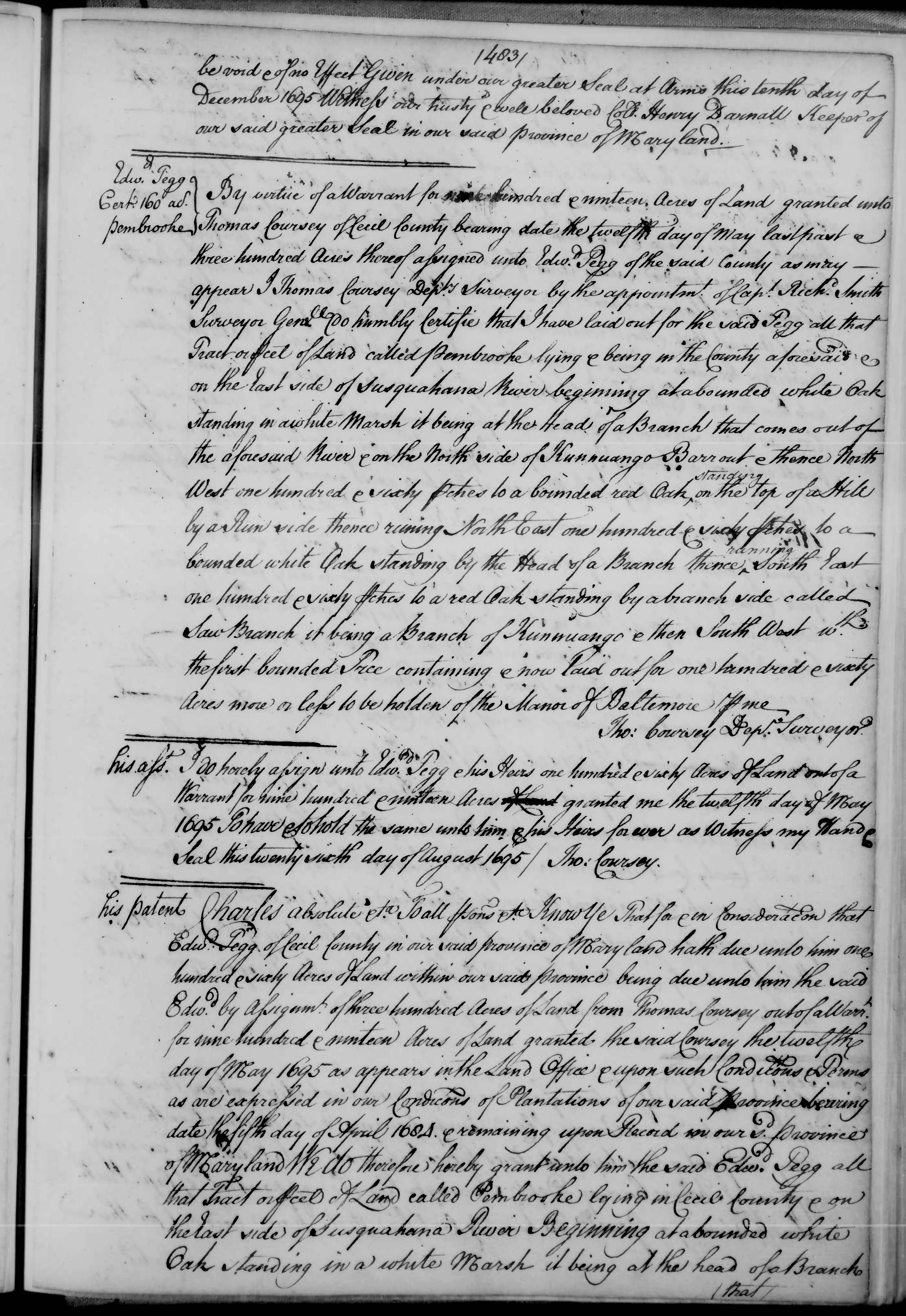
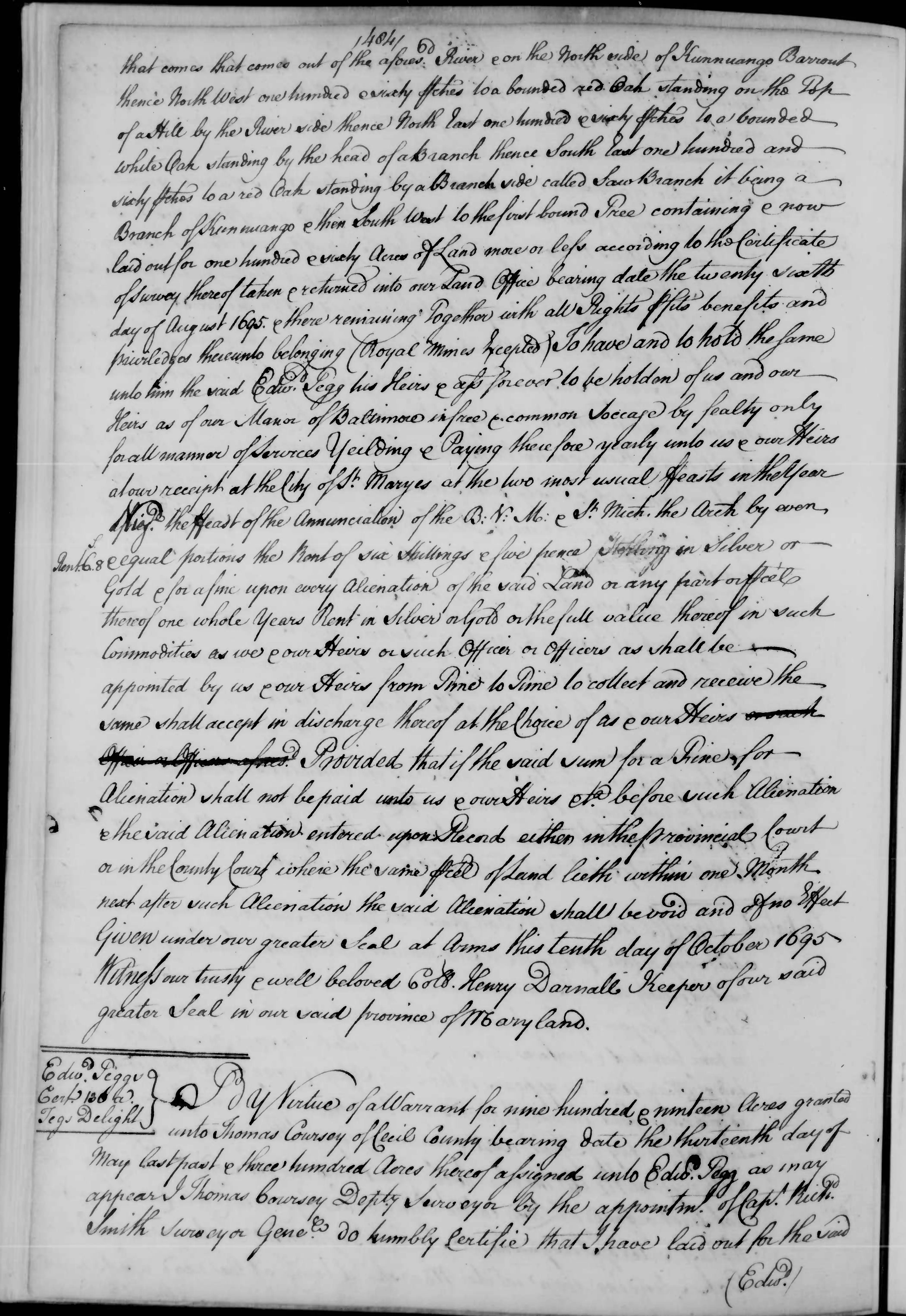
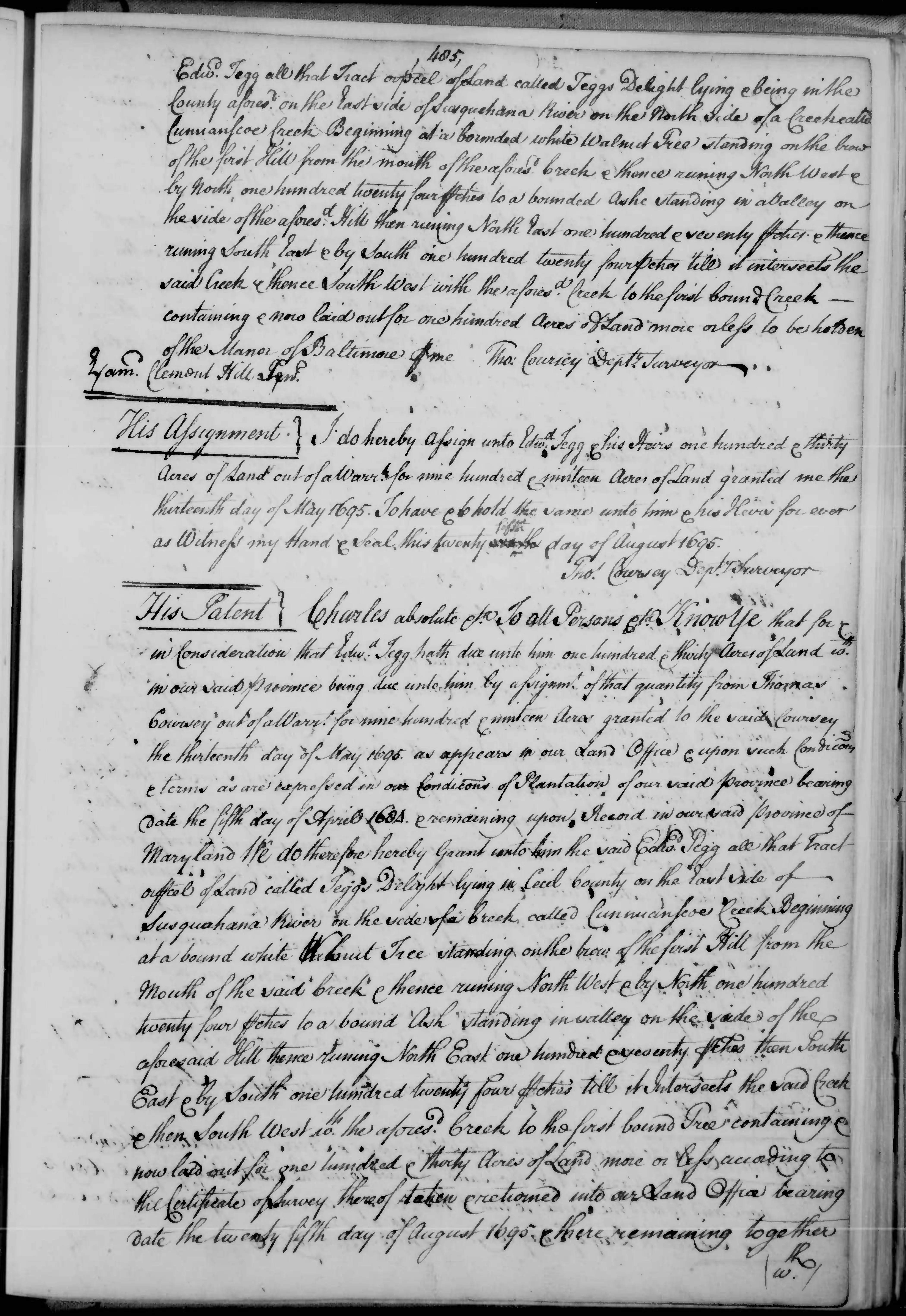
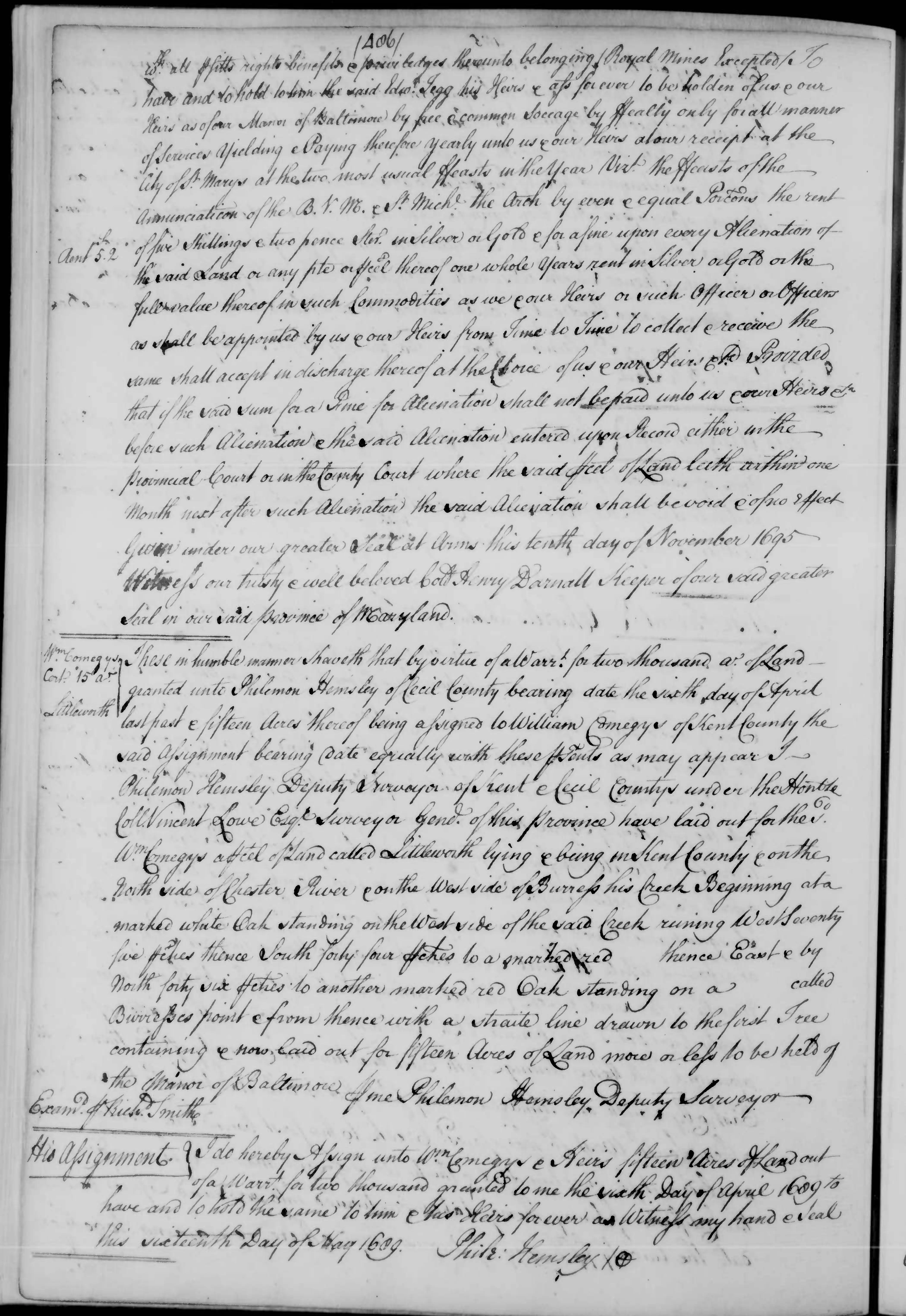
Edward’s life, like many settlers of the time, was not without challenges. In January 1687, a warrant was issued for his arrest over an unpaid debt:
Entries returnable the Second Tuesday in Janry: Anno Dom 1687. n:est: Invts Caps agt Edward Teague to answer to Thomas Roberts of a plea of Debt John Robinson Subpd on; the part of y plte.
The sheriff was unable to locate Edward to answer the plea, but the record suggests financial struggles that were not uncommon for settlers trying to establish themselves in the New World. Edward was likely balancing the demands of managing land, dealing with the colonial economy, and surviving on the frontier.
By 1695, Edward had overcome these challenges, having secured land patents and established himself as a landowner. The inventory of his estate upon his death in 1697 lists practical items, including tools for farming and maintaining a homestead, as well as personal effects like a feather bed, chests, and brandy. Tobacco was listed among his possessions, indicating that Edward participated in Maryland’s cash-crop economy.
Edward Teague married Susannah Welch, and together they had at least three children: William, Catherine, and Anne. William, born around 1695, would eventually migrate to North Carolina, continuing the family’s westward expansion that characterized many colonial families. This migration pattern aligns with the larger trend of frontier families seeking new opportunities in less populated regions of the colonies.
After Edward’s death in 1697, Susannah remarried Emanuel Smith, who became the administrator of Edward’s estate. Edward’s estate was finally settled in 1702, reflecting the often complex process of probate in colonial Maryland, particularly on the frontier.
Edward Teague’s life ended tragically in 1697. He is believed to have drowned in the Susquehanna River, near his property. Local records indicate that his body was never recovered, adding an air of mystery to his death:
Edward Teague died in the River that runs through Tegg’s Delight. According to the Cecil County Historical Society, his body was never recovered.
The lack of documentation regarding his burial further complicates the narrative, with no known grave site. Edward’s widow and children continued on, with Susannah managing his estate until her remarriage.
Edward Teague’s descendants continued to play significant roles in American history. His son William Teague migrated to North Carolina, establishing the family in a region that would later become important during the American Revolution. William’s son, Moses Teague, fought as a patriot during the war, further cementing the family’s place in early American history. Moses’s grandson, William Ray, carried on the family’s military tradition, serving in the Ohio Militia during the War of 1812.
The land that Edward once called home remains a physical testament to his legacy. Today, Tegg’s Delight and Pembroke are part of Camp Conowingo, a Girl Scouts camp in Maryland. Though much has changed, traces of Edward’s original homestead still stand, a silent witness to the life of a man who helped settle Maryland’s frontier.
Edward Teague’s story, while pieced together from fragments of history, remains a testament to the resilience of early settlers. From his arrival in Maryland as a teenage servant to his establishment as a landowner and patriarch of a prominent family line, Edward’s life is a microcosm of the colonial experience, filled with struggle, survival, and the pursuit of opportunity in the New World.
Additional memberships will be added as they are approved.
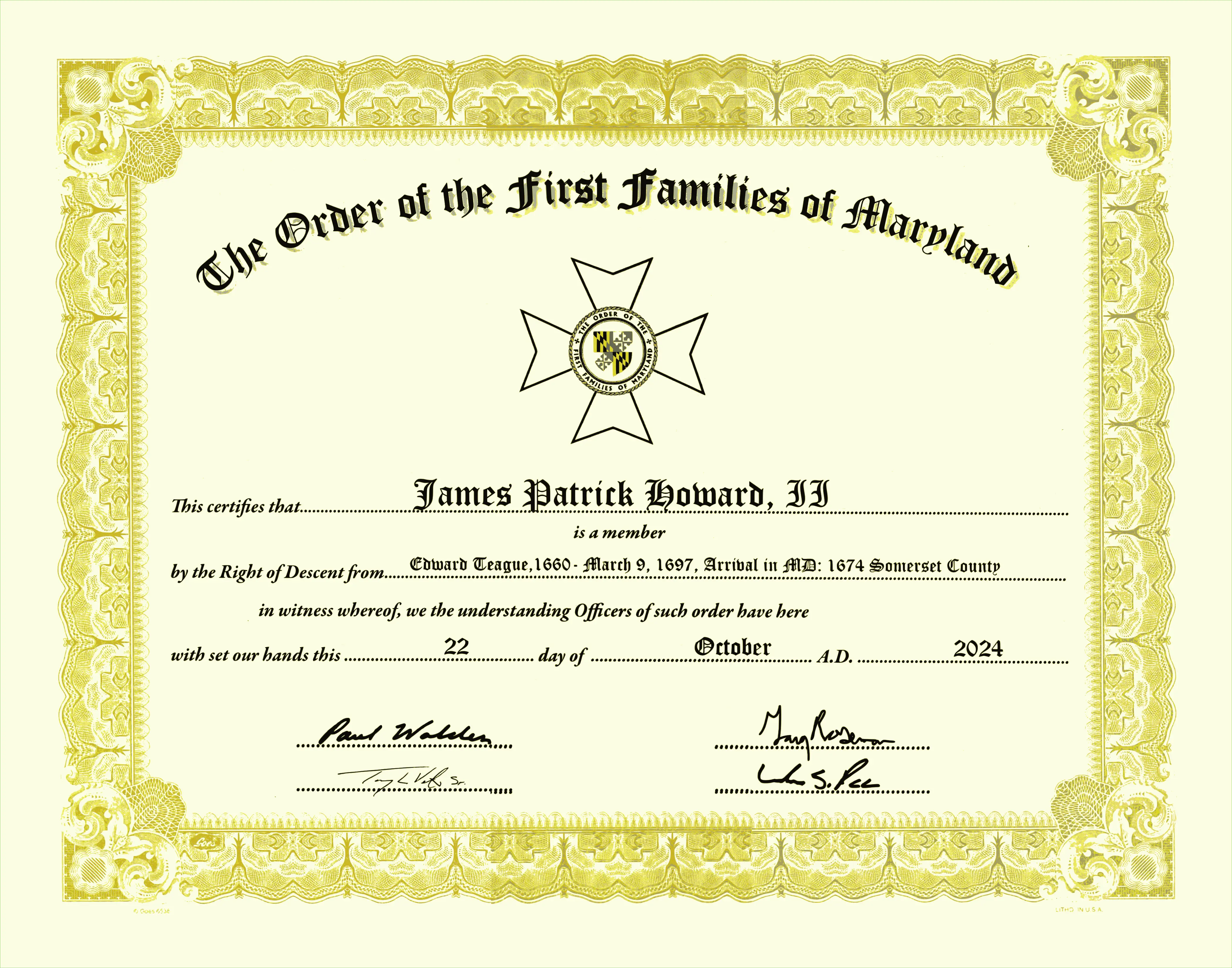
Or you can download the PDF here.